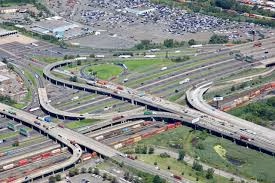New Jersey Turnpike Authority (NJTA) is moving forward with the $11B Newark Bay–Hudson County Extension Improvements Program, despite ongoing opposition. The program, a massive infrastructure project that will replace and widen a critical 8.1-mile section of the I-78 Turnpike Extension from Newark to Jersey Avenue in Jersey City. The project also calls for replacing the aging Newark Bay Bridge and adding lanes through Jersey City and Bayonne—duplicating current capacity in some locations. While sold as a job source and requisite infrastructure upgrade, the project is still loudly opposed on environmental and community bases.
Phase 1 construction will begin in 2026 and will take approximately 10 years. The whole project involving the rehabilitation of 29 bridges will be completed by 2040.
Project Scope and Timeline
The project is planned in phases:
Phase 1 (Exits 14 to 14A): Replacement of Newark Bay Bridge and four-lane widening in both directions. Estimated cost: $6 billion.
Phase 2 (Exits 14A to 14B): Will expand the highway from two to three lanes in each direction.
Phase 3 (14B to Columbus Drive): Mainly structural upgrades, i.e., shoulders but no additional lanes.
Final Phase (Phase 4) (Columbus Drive to Jersey Avenue): Final segment will involve replacement of remaining bridges and continuing modernization.
Economic and Safety Justifications
Supporters cite the need to replace deteriorating infrastructure that has more than doubled its initial lifespan. The Vincent R. Casciano Memorial Bridge over Newark Bay, NJTA officials note, cannot be safely and reasonably repaired and must be replaced altogether. The agency also refers to the project offering more than 25,000 jobs during construction, facilitating freight movement, and improving long-term highway safety by offering shoulders and advanced structural elements.
Funding for the project will come entirely from toll revenues, not taxpayer dollars. NJTA officials also noted during June 18 hearing that $500 million will be allocated to support NJ Transit and the Gateway rail project, though toll funds legally cannot be directly diverted to public transit operations.
Concerns and Controversy
Despite progress, resistance remains fierce among the public. Recent public hearing last June 19 in Bayonne witnessed dozens of protesters protesting environmental destruction, increased traffic, and potential displacement of community dwellers.
Environmental Impact
Detractors claim that the project will lead to increased automobile emissions, noise pollution, and destruction of local ecosystems. Despite permits given by the U.S. Coast Guard, claiming no material environmental impact was found, local advocacy groups remain skeptical.
Induced Traffic
Critics warn that adding half a highway’s capacity will encourage more driving, which may invalidate any congestion relief and dump even more traffic on already crowded neighborhood streets.
Disruption to the Community
There are also concerns about the use of eminent domain for the taking of property, which would displace residents and small businesses. NJTA has not finalized the final roll of impacted properties.
Read also: Orange County Advances Plans for Futuristic $35M I-Drive Pedestrian Bridge
Continuing Planning and Variables in Cost
Project advisor Mike Morgan on June 18 verified that material and labor costs are still unstable. The agency is closely monitoring the cost of steel, concrete, and cement, along with the impact of federal tariffs put into place in the first place by the Trump administration.
There are other safety upgrades, including shoulders near the Holland Tunnel, which are envisioned to improve maintenance and access by emergency vehicles. NJTA officials also said that most of the traffic on the extension is associated with the Port of Bayonne, and not commuter traffic through the Holland Tunnel.
While the Newark Bay–Hudson County Extension Improvements Program has overcome significant regulatory hurdles and secured permits, it is an extremely controversial project. As construction is set to begin in 2026, state regulators will continue to face opposition from neighborhoods and environmental organizations even as they move forward with one of New Jersey’s most expensive infrastructure projects in decades.
Read also: Design Unveiled for New Cable-Stayed Brent Spence Companion Bridge
NJTA’s $11B Extension Program: Project Fact Sheet
Project Overview
Total Cost: $11 billion
Timeline: 2026-2040 (14-year construction period)
Scope: Replace and widen highway, replace Newark Bay Bridge, add lanes through Jersey City and Bayonne
Project Phases
Phase 1: Turnpike Exits 14 to 14A
Replace Newark Bay Bridge
Four-lane widening in both directions
Cost: $6 billion
Phase 2: Exits 14A to 14B
Expand from two to three lanes each direction
Phase 3: 14B to Columbus Drive
Structural upgrades and shoulders (no additional lanes)
Phase 4: Columbus Drive to Jersey Avenue
Bridge replacements and modernization
NJTA’s $11B Extension Program: Key Features
Bridges: 29 bridges to be rehabilitated/replaced
Jobs: 25,000+ construction jobs anticipated
Funding: 100% toll revenue (no taxpayer funds)
Transit Support: $500 million allocated to NJ Transit and Gateway rail project
Current Status
Permits secured (including U.S. Coast Guard approval)
Construction begins 2026
Project completion targeted for 2040
Community opposition ongoing
Read also: Major construction milestone reached in Gordie Howe International Bridge project

Leave a Reply